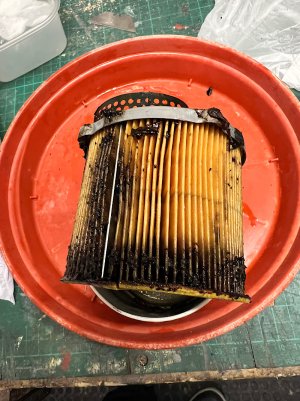chris-s
Well-known member
In preparation for the new season, today’s job was to change the fuel filters and wake up the engine.
Just for giggles I decided to cut open the primary filter and found this….

Sludge or bug?
We’ve had the boat for a season, have always dosed with marine 16 fuel complete and filled the tank to overflowing back in October when we were hauled out.
Last spring before launching I rigged up a filter, pump and rigid pipe to clean out the tank thru the sender hole, not a lot came out but probably worth doing again.
Just for giggles I decided to cut open the primary filter and found this….

Sludge or bug?
We’ve had the boat for a season, have always dosed with marine 16 fuel complete and filled the tank to overflowing back in October when we were hauled out.
Last spring before launching I rigged up a filter, pump and rigid pipe to clean out the tank thru the sender hole, not a lot came out but probably worth doing again.
